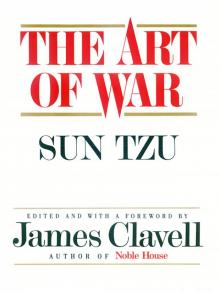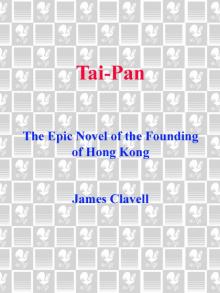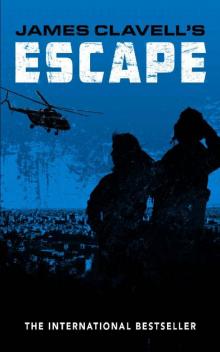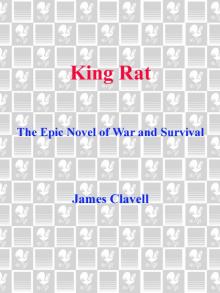- Home
- James Clavell
Escape Page 2
Escape Read online
Page 2
McIver held the phone closer to his ear as the volume slipped a fraction, afraid that the connection would vanish. ‘Yes, George, you were saying?’
Talbot continued: ‘I was just saying, Duncan, we’re quite sure everything’s going to work out eventually. There’s no way in the world the pot will completely blow up. An unofficial source says a deal’s already in place for the Shah to abdicate in favour of his son Reza—the compromise HM Government advocates. The transition to constitutional government—helped by the long overdue military coup—may be a bit wobbly but nothing to worry about. Sorry, got to dash—let me know what you decide an—’
The phone went dead.
McIver cursed, jiggled the connectors to no avail, and told Genny and Charlie what Talbot had said. Genny smiled sweetly. ‘Don’t look at me, the answer’s no. I agr—’
‘But, Gen, Tal—’
‘I agree the others should go but this one’s staying. Food’s almost ready.’ She went back to the kitchen and closed the door, cutting off further argument.
‘Well she’s bloody going and that’s it,’ McIver said.
‘My year’s salary says she won’t—until you leave. Why don’t you go for God’s sake? I can look after everything.’
‘No. Thanks, but no.’ Then McIver beamed in the semi-darkness. ‘Actually it’s like being back in the war, isn’t it? Back in the bloody blackout. Nothing to worry about except get with it and look after the troops and obey orders.’ He watched Pettikin for a while, trying to raise their base at Bandar-e Delam. ‘Did you know the American who was killed, Stanson?’
‘No. You?’
‘Yes. Just an ordinary sort of fellow, an area manager for ExTex. I met him once. There was a story he was CIA but I think that was just a rumour.’ McIver frowned at his glass. ‘Talbot was right about one thing: we re bloody lucky to be British. Tough on the Yanks. Not fair.’
‘Yes, but you’ve covered ours as best you can.’
‘Hope so.’ When the Shah had left and violence everywhere increased, McIver had issued British IDs to all Americans. They should be all right unless the Revolutionary Guards, police, or SAVAK check them against their licences.’ By Iranian law all foreigners had to have a current visa, which had to be cancelled before they could leave the country, a current ID card giving their corporate affiliate—and all pilots a current annual Iran pilot’s licence. For a further measure of safety McIver had had corporate IDs made and signed by the chief of their Iranian partners in Tehran. So far there had been no problems.
Pettikin was trying to call Bandar-e Delam on the HF with no success. ‘We’ll try later,’ McIver said. ‘All bases’ll be listening out at 0830—that’ll give us time to decide what to do. Christ, it’s going to be bloody difficult. What do you think? Status quo, except for dependents?’
Very concerned, Pettikin got up and took a candle and peered at the operations map pinned to the wall. It showed the status of their bases, crew, ground staff, and aircraft. Most were self-contained with transport, spares and repair facilities. The bases were scattered over Iran, from air force and army training bases at Tehran and Isfahan, to a logging operation in Tabriz in the northwest, a uranium survey team near the Afghan border, from a pipeline survey on the Caspian, to oil rig operations on or near the Gulf and the Strait of Hormuz. Of these only five were operational now: ‘We’ve fifteen 212s, including two non-operational on their two-thousand-hour checks, seven 206s, and three Alouettes, all supposed to be working at the moment. . ..’
‘And all leased on binding legal contracts, none of which have been rescinded, but none of which we’re being paid for,’ McIver said testily. ‘We can’t even legally remove any one of them without the approval of the contractor, or our dear partners’ approval—not unless we could declare force majeure.’
‘There isn’t any yet. It has to be status quo, as long as we can. Talbot sounded confident. Status quo.’
‘I wish it was status quo, Charlie. My God, this time last year we had almost forty 212s working and all the rest.’ McIver poured himself another whisky.
‘You’d better go easy,’ Pettikin said quietly. ‘Genny’ll give you hell. You know your blood pressure’s up and you’re not to drink.’
‘It’s medicinal, for Christ’s sweet sake.’ A candle guttered and went out. McIver got up and lit another and went back to staring at the map. ‘I think we’d better get Azadeh and Erikki, our Flying Finn back. His 212’s on its fifteen-hundred-hour so he could be spared for a couple of days.’ This was Captain Erikki Yokkonen and his Iranian wife, Azadeh, and their base was near Tabriz in East Azerbaijan Province, to the far northwest, near the Soviet border. ‘Why not take a 206 and fetch them? That’d save him three hundred and fifty miles of lousy driving and we’ve got to take him some spares.’
Pettikin was beaming. ‘Thanks, I could do with an outing. I’ll file a flight plan by HF tonight and leave at dawn, refuel at Bandar-e Pahlavi, and buy us some caviar.’
‘Dreamer. But Gen’d like that. You know what I think of the stuff’ McIver turned away from the map. ‘We’re very exposed, Charlie, if things got dicey.’
‘Only if it’s in the cards.’
Chapter 1
At Base Tabriz One: 11:05 P.M. Erikki Yokkonen was naked, lying in the sauna that he had constructed with his own hands, the temperature 107 degrees Fahrenheit, the sweat pouring off him, his wife Azadeh nearby, also lulled by the heat. He lay on one arm and looked at her. She was lying on a thick towel on the bench opposite. Her eyes were closed and he saw her breast rising and falling and the beauty of her—raven hair, chiselled Aryan features, lovely body, and milky skin—and as always he was filled with the wonder of her, so small against his six foot four. He was Finnish by birth, thirty-seven, American and British schooled and trained, and like most helicopter pilots, cosmopolitan.
Tonight had been grand with lots of food and two bottles of the best Russian vodka that he had purchased black market in Tabriz and had shared with his two English engineers, and their station manager, Ali Dayati. ‘Now we’ll have sauna,’ he had said to them just before midnight. But they had declined, as usual, with hardly enough strength to reel off to their own cabins. ‘Come on, Azadeh!’
‘Not tonight, please, Erikki,’ she had said, but he had just laughed, wrapped her fur coat around her clothes, and carried her through the front door of their cabin, out past the pine trees heavy with snow, the air just below freezing. She was easy to carry, and he went into the little hut that abutted the back of their cabin, into the warmth of the changing area and then, unclothed, into the sauna itself. And now they lay there, Erikki at ease, Azadeh, even after a year of marriage, still not quite used to the nightly ritual.
Gods of my ancestors, thank you for giving me such a woman, he thought. For a moment he could not remember which language he was thinking in. He was quadrilingual, Finnish, Swedish, Russian and English. What does it matter he told himself, giving himself back to the heat, letting his mind waft with the steam that rose from the stones he had laid so carefully. It satisfied him greatly that he had built his sauna himself—as a man should—hewing the logs as his ancestors had done for centuries.
This was the first thing he had done when he was posted here four years ago—to select and fell the trees. The others had thought him crazy. He had shrugged good-naturedly. ‘Without a sauna life’s nothing. First you build the sauna, then the house; without sauna a house is not a house; you English, you know nothing—not about life.’ He had been tempted to tell them that he had been born in a sauna, like many Finns—and why not, how sensible when you think of it, the warmest place in the home, the cleanest, quietest, most revered. He had never told them, only Azadeh. She had understood. Ah, yes, he thought, greatly content, she understands everything.
Outside, the threshold of the forest was silent, the night sky cloudless, the stars very bright, snow deadening sound. Half a mile aw
ay was the only road through the mountains. The road meandered northwest to Tabriz, ten miles away, thence northwards to the Soviet border a few miles farther on Southeast it curled away over the mountains, at length to Tehran, 350 miles away.
The base, Tabriz One, was home for two pilots—the other was on leave in England—two English engineers, the rest Iranians: two cooks, eight day labourers, the radio op, and the station manager. Over the hill was their village of Abu-Mard and, in the valley below, the wood-pulp factory belonging to the forestry monopoly, Iran-Timber, they serviced under contract. The 212 took loggers and equipment into the forests, helped build camps and plan the few roads that could be built, then serviced the camps with replacement crews and equipment and flew the injured out. For most of the landlocked camps the 212 was their only link with the outside, and the pilots were venerated. Erikki loved the life and the land, so much like Finland that sometimes he would dream he was home again.
His sauna made it perfect. The tiny, two-room hut at the back of their cabin was screened from the other cabins, and built traditionally with lichen between the logs for insulation, the wood fire that heated the stones well ventilated. Some of the stones, the top layer, he had brought from Finland. His grandfather had fished them from the bottom of a lake, where all the best sauna stones come from, and had given them to him on his last home leave eighteen months ago. ‘Take them, my son, and with them surely there’ll go a good Finnish sauna tonto’—the little brown elf that is the spirit of the sauna—‘though what you want to marry one of those foreigners for and not your own kind, I really don’t know.’
‘When you see her, Grandfather, you’ll worship her also. She has blue-green eyes and dark-dark hair an—’
‘If she gives you many sons—well, we’ll see. It’s certainly long past the time you should be married, a fine man like you, but a foreigner? You say she’s a schoolteacher?’
‘She’s a member of Iran’s Teaching Corps, they’re young people, men and women, volunteers as a service to the state, who go to villages and teach villagers and children how to read and write, but mostly the children. The Shah and the Empress started the corps a few years ago, and Azadeh joined when she was twenty-one. She comes from Tabriz where I work, teaches in our village in a makeshift school and I met her seven months and three days ago. She was twenty-four then. . ..’
Erikki glowed, remembering the first time he ever saw her, neat in her uniform, her hair cascading, sitting in a forest glade surrounded by children, then her smiling up at him, seeing the wonder in her eyes at his size, knowing at once that this was the woman he had waited his life to find. He was thirty-six then. Ah, he thought, watching her lazily, once more blessing the forest tonto—spirit—that had guided him to that part of the forest. Only three more months then two whole months of leave. It will be good to be able to show her Suomi—Finland.
‘It’s time, Azadeh, darling,’ he said.
‘No, Erikki, not yet, not yet,’ she said half asleep, drowsed by the heat but not by alcohol, for she did not drink. ‘Please, Erikki, not y—’
‘Too much heat isn’t good for you,’ he said firmly. They always spoke English together, though she was also fluent in Russian—her mother was half Georgian, coming from the border area where it was useful and wise to be bilingual. Also she spoke Turkish, the language most used in this part of Iran, Azerbaijan, and of course Farsi. Apart from a few words, he spoke no Farsi or Turkish. He sat up and wiped the sweat off, at peace with the world, then leaned over and kissed her. She kissed him back and trembled as his hands sought her and hers sought him back. ‘You’re a bad man, Erikki,’ she said, then stretched gloriously.
‘Ready?’
‘Yes.’ She clung to him as he lifted her so easily into his arms, then walked out of the sauna into the changing area, then opened the door and went outside into the freezing air. She gasped as the cold hit her and hung on as he scooped up some snow and rubbed it over her, making her flesh tingle and burn but not painfully. In seconds she was glowing within and without. It had taken her a whole winter to get used to the snow bath after the heat. Now, without it, the sauna was incomplete. Quickly she did the same for him, then rushed happily back into the warm again, leaving him to roll and thrash in the snow for a few seconds. He did not notice the group of men standing in a shocked group up the rise, half-hidden under the trees beside the path, fifty yards away. Just as he was closing the door he saw them. Fury rushed through him. He slammed the door.
‘Some villagers are out there. They must have been watching us. Everyone knows this is off limits!’ She was equally enraged and they dressed hurriedly. He pulled on his fur boots and heavy sweater and pants and grabbed the huge axe and rushed out. The men were still there and he charged them with a roar, his axe on high. They scattered as he whirled at them, then one of them raised the machine gun and let off a burst into the air that echoed off the mountainside. Erikki skidded to a halt, his rage obliterated. Never before had he been threatened with guns, or had one levelled at his stomach.
‘Put axe down,’ the man said in halting English, ‘or I kill you.’
Erikki hesitated. At that moment Azadeh came charging between them and knocked the gun away and began shouting in Turkish: ‘How dare you come here! How dare you have guns—what are you, bandits? This is our land—get off our land or I’ll have you put in jail!’ She had wrapped her heavy fur coat over her dress but was shaking with rage.
‘This is the land of the people,’ the man said sullenly, keeping out of range. ‘Cover your hair, woman, cover y—’
‘Who’re you? You’re not of my village! Who are you?’
‘I’m Mahmud, a mullah in Tabriz.’
‘Your accent isn’t Tabrizi. What are you, a false mullah who tries to marry the Koran and Marx and serves foreign masters?’
‘We serve God and the masses. I’m not one of your lackeys,’ he said angrily and jumped aside as Erikki lunged at him. The man with the gun was off balance but another man, safely away, cocked his rifle: ‘By God and the Prophet, stop the foreign pig or I’ll blow you both to the hell you deserve!’
‘Erikki, wait! Leave these dogs to me!’ Azadeh called out in English, then shouted at them, ‘What do you want here? This is our land, the land of my father Abdollah Khan, Khan of the Gorgons, kin to the Qajars who’ve ruled here for centuries.’ Her eyes had adjusted to the darkness now and she peered at them. There were ten of them, all young men, all armed, all strangers, all except one, the kalandar—chief—of their village. ‘Kalandar, how dare you come here!’
‘I’m sorry, Highness,’ he said apologetically, ‘but the mullah said I was to lead him here by this trail and not by the main path and so—’
‘What do you want, parasite?’ she said, turning on the mullah.
‘Show respect, woman,’ the man said even more angrily. ‘Soon we’ll be in command. The Koran has laws for nakedness and loose living: stoning and the lash.’
‘The Koran has laws for false mullahs and trespass and bandits and threatening peaceful people, and rebellion against their chiefs and liege lords. I’m not one of your frightened illiterates! I know you for what you are and what you’ve always been, the parasites of the villages and the people. What do you want?’
From the base, people were hurrying up with flashlights. At their head were the two bleary-eyed engineers, Dibble and Arberry, with Ali Dayati carefully in tow. All were sleep ruffled, hastily dressed, and anxious. ‘What’s going on?’ Dayati demanded, thick glasses on his nose, peering at them. His family had been protected by and had served the Gorgon Khans for years. ‘Who ar—’
‘These dogs,’ Azadeh began hotly, ‘came out of the nigh—’
‘Hold your tongue, woman,’ the mullah said angrily, then turned on Dayati. ‘Who’re you?’
When Dayati saw the man was a mullah, his demeanour changed and at once he became deferential. ‘I’m. . . I’m Iran-Timbe
r’s manager here, Excellency. What’s the matter, please, what can I do for you?’
‘The helicopter. At dawn I want it for a flight around the camps.’
‘I’m sorry, Excellency, the machine is in pieces for an overhaul. It’s the foreigner’s policy an—’
Azadeh interrupted angrily, ‘Mullah, by what right do you dare to come here in the middle of the night to—’
‘Please, Highness,’ Dayati said, pleading with her. ‘Please leave this to me, please, I beg you.’
But she began to rage and the mullah to rage back, and the others joined in, the mood becoming ugly, until Erikki raised his axe and let out a bellow of rage, infuriated that he could not understand what was being said. The silence was sudden, then another man cocked his machine pistol.
‘What’s this bastard want, Azadeh?’ Erikki said.
She told him.
Dayati, tell him he can’t have my 212 and to get off our land now or I’ll send for the police.’
‘Please, Captain, please allow me to deal with it, Captain,’ Dayati said, sweating with anxiety, before Azadeh could interrupt. ‘Please, Highness, please leave now.’ Then turned to the two engineers, ‘It’s all right, you can go back to bed. I’ll deal with it.’
It was then that Erikki noticed Azadeh was still barefoot. He scooped her up into his arms. ‘Dayati, you tell that matyeryebyets and all of them if they come here again at night I’ll break their necks—and if he or anyone touches one hair of my woman’s head I’ll crawl into hell after him if need be.’ He went off, massive in his rage, the two engineers following.
A voice in Russian stopped him. ‘Captain Yokkonen, perhaps I could have a word with you in a moment?’

 Gai-Jin
Gai-Jin The Art of War
The Art of War Tai-Pan
Tai-Pan Noble House
Noble House Shōgun
Shōgun Whirlwind
Whirlwind Escape
Escape King Rat
King Rat The Children's Story
The Children's Story